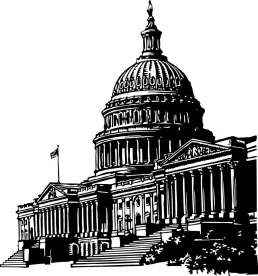They’re Baaaack.
Congress is back in session this week, and my commute once again came to a grinding halt. With roughly three months of scheduled work in D.C. before the end of the year, members in both the U.S. House of Representatives and U.S. Senate are strategizing on how best to use this time. For example, government funding runs out at the end of the month, and Congress will have to come to an agreement—a temporary continuing resolution is likely—to avoid another government shutdown like the one we experienced earlier this year. In the Senate, Majority Leader Mitch McConnell (R-KY) has wasted no time and is already working on confirming more executive branch nominees. In the House, the Buzz is watching activity concerning arbitration agreements (more below) and the Protecting the Right to Organize Act of 2019 (PRO Act), among other matters.
EEO-1 and Done?
On September 12, 2019, the Equal Employment Opportunity Commission (EEOC) published in the Federal Register a notice of information collection seeking approval from the Office of Management and Budget for a renewed EEO-1 Component 1 form. Importantly, the EEOC will not seek renewal of the Component 2 form that collects wage and hour data, stating:
At this point in time, the unproven utility to its enforcement program of the pay data as defined in the 2016 Component 2 is far outweighed by the burden imposed on employers that must comply with the reporting obligation. Therefore, the EEOC is not seeking to renew Component 2 of the EEO-1.
The renewal submission does not impact employers’ obligations to submit 2017 and 2018 Component 2 data by September 30, 2019. Leigh M. Nason and Hera S. Arsen have the details.
NLRB Activity.
The National Labor Relations Board (NLRB) is on a roll and continues to churn out significant decisions.
-
Earlier this week, the Board ruled that a partial plant bargaining unit at a manufacturing facility was inappropriate because, in part, the employees’ interests in that unit were not sufficiently distinct from the interests of excluded employees. In clarifying its 2017 decision in PCC Structurals, Inc., the Board set forth a three-step process for determining an appropriate bargaining unit: “First, the proposed unit must share an internal community of interest. Second, the interests of those within the proposed unit and the shared and distinct interests of those excluded from that unit must be comparatively analyzed and weighed. Third, consideration must be given to the Board’s decisions on appropriate units in the particular industry involved.”
-
Late last week, the Board continued its recent string of decisions clarifying employers’ private property rights when confronted by union activity. In the most recent case, the Board ruled that employers may prohibit access to non-employee organizers or protestors as long as they prohibit access to other non-employees who engage in similar activities. Generally speaking, this means that employers will usually be permitted to exclude non-employee union organizers but allow charitable organizations onto their premises. Harry J. Secaras has the details.
-
Finally, Anthony B. Byergo explains how a recent Board decision returns some common sense and stability to the relationship between unions and employers by adopting a “covered by the contract” analysis when evaluating whether an employer has a duty to bargain with a union over potential changes to workplace policies, rules, and the like.
Perks at Work.
On September 8, 2019, the U.S. Department of Labor’s Wage and Hour Division sent to the Office of Information and Regulatory Affairs (OIRA) its proposed rule clarifying what type of remuneration must be included in employees’ regular rate of pay for purposes of calculating overtime. The proposal joins three other high-profile rulemakings under review at OIRA: those involving overtime, tip, and fluctuating workweek regulations. It is shaping up to be a busy fall in the wage and hour regulatory arena.
Anti-Arbitration Bill Advances.
On September 10, 2019, the House Judiciary Committee approved the Forced Arbitration Injustice Repeal (FAIR) Act, which would prohibit predispute arbitration agreements in employment, consumer, antitrust, and civil rights disputes. The bill is expected to be passed by the full House sometime next week (it has 222 House cosponsors). Employer groups strongly oppose the bill, which will likely be dead on arrival in the Senate, even though the Senate version has 34 cosponsors (all Democrats).
Cleveland Rocks.
September 9, 2019, marked the 126th anniversary of a unique moment in presidential history. On that day in 1893, First Lady Frances Cleveland gave birth to a daughter, Esther, who remains the only child of a president to be born in the White House. But Esther might not even be the most famous of Frances and President Grover Cleveland’s children. Her younger brother, Richard Cleveland, was an attorney who defended Whittaker Chambers against Alger Hiss’s libel suit. And Esther’s older sister, Ruth, is claimed to be the namesake of the Baby Ruth candy bar. But it seems more likely that this claim was advanced by the maker of the candy bar in order to avoid compensating Babe Ruth, the famous baseball player whose career was beginning to take off and who, perhaps not so coincidentally, happened to belt 54 home runs in 1920, the year before the candy bar debuted.




 />i
/>i

